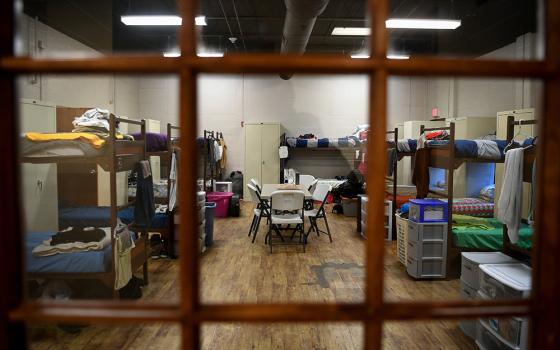Gossipy rumors have been mixed with more than a pinch of midsummer madness and served, stirred but not chilled, as a James Bond-like intrigue cocktail for Vatican conspiracy theorists who like to keep a glow on their paranoia.
The main ingredients are the leaked confidential papers of Pope Benedict XVI in an incident that has led to interpretations of such battles for influence inside the Curia that Der Spiegel claims that the "mood at the Vatican is apocalyptic."
Turmoil has followed the arrest and imprisonment of papal valet, Paolo Gabriele, in a 377-square-foot cell, one window, no TV, that most people did not know lies deep in the Vatican maze, with the explanation that the butler did it, or, rather, the butler is taking the fall in a plot, code-named, honest to God, Maria, engineered by high-ranking officials to circulate papers damaging two close papal aides, Cardinal Tarcisio Bertone, the Vatican Secretary of State, and Benedict's secretary from the old country, Monsignor Georg Ganswein. Despite deep-sixing the butler, the Dreyfuss of this comic opera, new documents have surfaced with the threat of more to come if Bertone and Ganswein are not forced out of their jobs.
These demands associated with "VatiLeaks" have been characterized by Vatican expert Marco Politi as "blackmail" and "total war" and have embarrassed the 85-year-old pope who is described as distant from day-to-day administration while absorbed in writing speeches and books with a little piano-playing on the side. Understandable in the is-anybody-watching-my-back atmosphere in the papal apartment, Benedict has emphasized in recent talks to audiences as varied as seminarians and graduates of the Vatican diplomatic academy the need for absolute fidelity and loyalty to the Roman pontiff. He reportedly has plans to modernize the curial structure, a pledge more like a pipe dream that has eluded many of his predecessors and seems, along with everything else, to those scrutinizing his smallest gestures, to be wearing Benedict down as well.
The superficial and, to some, highly satisfying explanation for this event is that it bears the fingerprints of officials located, like a pitcher's fast ball, high and on the inside of the Vatican's power structure. That may be the setting for VatiLeaks, but the plotters, if they exist, are merely playing roles in working out an historical destiny that will ultimately confound them as it consumes the pope himself.
The inability to control information at the top is a first-order Space-and-Information-Age effect that can be observed now in all traditionally structured entities, from great businesses to great churches. It was first observed on a world scale in 1986, when the vaunted top-down Soviet Union was unable to control the information about the nuclear meltdown at Chernobyl. It could be observed again a few years later when Chinese dissidents, using modern means of communication that meant that revolutions transcended physical space, carried out protests that for weeks frustrated the Communist government's efforts to repress it.
In hierarchical organizations, information has always been considered a "stock" good, one placed on the highest shelf in a locked closet to which only a privileged few possess the key. Information was to be controlled carefully by those at the top tier of the hierarchy and shared only in part and under constraints of strictest confidentiality with those at the intermediate hierarchical level and never with the broad bottom base of the hierarchical display.
Information, however, is by its nature a "flow" good and surges toward any pathway that allows it to move swiftly throughout its universe. It cannot, however, be treated as a "stock" good if the shelf on which it was placed, the closet within which it was locked, and the powerful who sought to control it all disappear. Information freed from hierarchy flows out of anybody's ultimate control. Hierarchies, unable to breathe in the high thin air of the Space and Information Age, begin to cough and sputter and lose their energy and capacity to manage the dissemination of information.
VatiLeaks is less the product of hierarchs exercising their Machiavellian instincts than it is an effect of the Space and Information Age that eclipses the pyramidal, graded structures of hierarchy so that higher-ups can no longer monopolize information at the top because that top has been sheared off by the sharp blade of history. The Age of Hierarchy actually ended centuries ago, when Copernicus and Galileo offered theories that the earth was not the center of the universe. No wonder popes condemned them. The latter sensed these scientists were right and that the hierarchical model that was the base of their power was doomed.
Strikingly, Vatican II, which convened at the beginning of the Space and Information Age, provided a renewed commitment to collegiality as a form of church government in which the authority of bishops was not delegated to them, but was theirs in their own right. As an expert theologian at Vatican II, Joseph Ratzinger supported this teaching that confronted what he considered a failure to understand that the church is governed by the pope and the bishops, not by the pope and the Curia. He also strongly supported the authority of the local churches to govern themselves, describing their role in reforming the liturgy "by their own authority" and describing the "decentralization of decision-making" as a "fundamental innovation." Conferences of bishops possessed "in their own right a definite legislative function."
Ratzinger trimmed back his enthusiasm for collegiality when Pope John Paul II made him prefect of the Congregation for the Doctrine of the Faith and followed the latter's insistence that the bishops were to be no more than helpers who did his bidding and no more than that. Bishops were considered collegial when they agreed with the autocratic Pope John Paul II. Ratzinger worked with John Paul in developing the latter's Apostolos Suos, the equivalent of a presidential executive order in which the pope emasculated national conferences of bishops, insisting they had advisory authority at best and must agree unanimously on their documents and then submit them to the Holy See for approval before issuing them.
This ended the fruitful period in which, for example, in the United States, the National Conference of Catholic Bishops wrote pastoral letters on the issues of peace and the economy that attracted so much national attention and discussion that the bishops' conference became the subject of a cover story in The New York Times Magazine.
Poignantly, the theologian who once enthusiastically supported the collegiality that would have prepared the church for life in the Space and Information Age played a role in destroying that concept and has committed himself and the world's bishops to the impossible task of restoring the hierarchical model in the church. The pope who once compared the high Mass
to an opera at which the audience, separated from its theatrical pomp, pursued private devotions such as saying the rosary and demanded that "the wall of Latinity" be breached is now trying to lead his flock back in time to the stilted Vatican I liturgy he once spurned.
The hierarchical structure of the Catholic church, a very different notion than Vatican II's vision of the church as a pilgrim People of God, is buckling under the impact of this new age, and the pope is a victim of his own failure to support the collegial idea that he once endorsed. VatiLeaks means the great shambling bureaucracy can no longer control the flow good of information that seeks the multiplied pathways to expression provided by the Space and Information Age. What seem to be plotting and scheming of high-level Vatican bureaucrats are actually their frantic efforts to keep their balance as the only world they have ever known cracks open beneath their feet, cutting jagged fissures through which once dammed-up information now flows like an engorged river.
Pope Benedict XVI is a good but beleaguered man, shaken and stirred at the gyrating center that he has tried to fix firmly in place. No wonder he wants to write books and talks, longs for loyalty to his pontificate, and plays his piano before it, too, falls through the floor with the rest of the hierarchical furniture.
[Eugene Cullen Kennedy is emeritus professor of psychology at Loyola University, Chicago.]
|
Editor's note: We can send you an email alert every time Kennedy's column, Bulletins from the Human Side," is posted to NCRonline.org. Go to this page and follow directions: Email alert sign-up. If you already receive email alerts from us, click on the "update my profile" button to add Kennedy to your list. |



